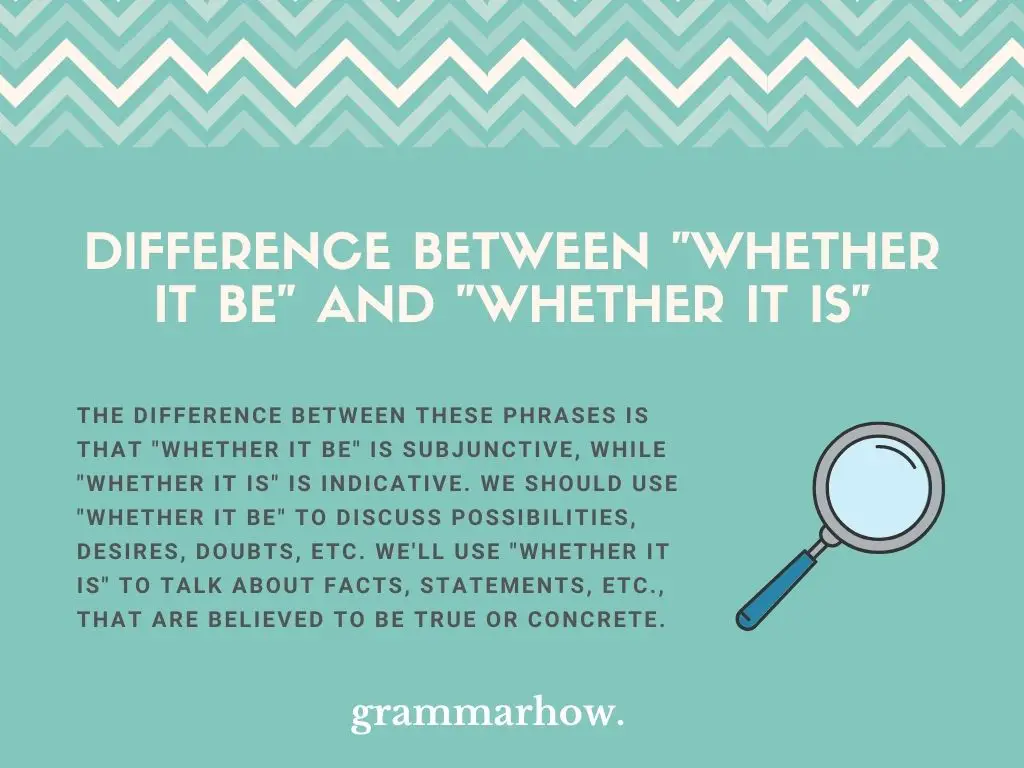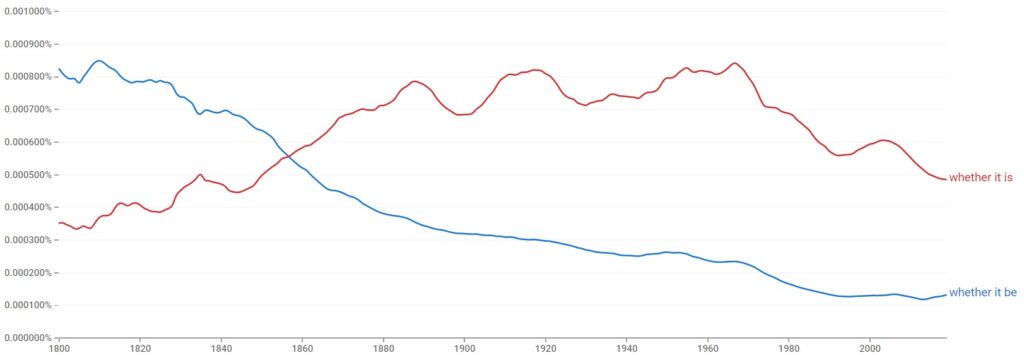The phrases “whether it be” and “whether it is” can seem to be quite consistent to people, which can cause some speculation over which is the correct phrase to utilize and when. In this article, we will be discussing both of these phrases, their meanings, and their appropriate uses.
What Is The Difference Between “Whether It Be” And “Whether It Is”?
The difference between these phrases is that “whether it be” is subjunctive, while “whether it is” is indicative. We should use “whether it be” to discuss possibilities, desires, doubts, etc. We’ll use “whether it is” to talk about facts, statements, etc., that are believed to be true or concrete.

It’s important to note that “whether it be” is subjunctive because it represents a conditional, as in the person who is speaking does not know the answer and will require the audience to discuss it. “Whether” is a conditional term, so it can cause the subjunctive form of a word or phrase to appear the same as the indicative form.
Because of this, “whether it is” is also deemed acceptable, but it may not be considered as formal as “whether it be”. Regardless, because “whether” is a conditional term, we can use the subjunctive or indicative form of this phrase and both will be understood.
Is “Whether It Be” Grammatically Correct?
The phrase “whether it be” is certainly considered to be grammatically correct. It is also considered to be a very formal and appropriate phrase to correctly utilize in a professional environment. Although it may come across as old-timey or foreign to some audiences, it often describes conditional or imaginary situations.
The correct use of “whether it be” would be to use this phrase in a formal or professional context, as this is where it will be most understood.
What Does “Whether It Be” Mean?
The meaning behind the phrase “whether it be” is essentially whichever it might be. This phrase is subjunctive, which means it is used in the grammatically correct context when there is a level of doubt, or multiple possibilities, options, etc.
“Whether it be” is often substituted for “whether it is” incorrectly because there is seemingly little difference. Although, if we are using the phrase to note a choice between more than two possibilities, we would use “whether it be”, as this would be the only correct phrase in this specific context.
We will now go over some examples of how to appropriately and correctly use this phrase in a sentence:
- Whether it be chips or pretzels, my husband loves any salty snack.
- We’ll go for a walk, whether it be raining or just very cold out.
- She enjoys outdoor activities, whether it be jogging, hiking, or gardening.
- We enjoy camping, whether it be in good weather or bad weather.
- Whether it be during a tense moment, a funeral, or in court, I am always joking.
- He understands all of my personality traits, whether they be a good or a bad one.
- There are always ways for people to misuse tools, whether it be a hammer or a miter saw.
- Whether it be roses or chocolates, I love receiving gifts showcasing affection.
- I enjoy indoor activities, whether it be reading, writing, or crafting.
- She enjoys drawing, whether it be portraits, landscapes, or sketches.
What Does “Whether It Is” Mean?
The meaning behind the phrase “whether it is” is essentially whether or not it is. This phrase is indicative, which means it is used in the grammatically correct context when used to make factual statements, ask questions, or express opinions as if they were a fact.
We will often see “whether it is” used in place of “whether it be”, but this is only correct when we are not discussing something that holds any doubt. These phrases cannot be used to describe the same things.
Therefore, we should choose to use “whether it is” when there are only two possibilities or choices, or when there is a level of certainty. This is when we are confident about the outcome or unique situation we are describing.
We will now go over various examples that emphasize the correct and accurate use of this particular phrase:
- My son loves a sweet treat, whether it is a cookie or a piece of cake.
- Whether it is working out at the gym or at home, she loves to stay in shape.
- Whether it is to Cuba or the Dominican, I love a warm vacation.
- I enjoy playing winter sports, whether it is hockey or curling.
- Whether it is raining or snowing, I will be there to watch your game.
- Whether it is raining or not, I still bring my dog for a walk.
- I love drinking coffee, whether it is hot or cold.
- I will go for a hike, whether it is winter or summer.
- My son will play outside every day, whether it is sunny or raining.
- My dog loves a treat, whether they are made from chicken or beef.
Are “Whether It Be” And “Whether It Is” Interchangeable?
The phrases “whether it be” and “whether it is” are not considered to be interchangeable. We cannot and should not use these phrases interchangeably because one is subjunctive, while the other is indicative – which makes their meanings and use quite different.
While we do sometimes see “whether it is” occasionally substituted for “whether it be”, this should be considered incorrect, despite how easily it comes across to an audience during a conversation.
As we have previously gone over, we will use “whether it be” in instances that involve question or doubt over an outcome, while we will use “whether it is” when we have certainty or a guarantee over the outcome.
Is “Whether It Be” Or “Whether It Is” Used The Most?
When looking at the data provided by Google Ngram Viewer, we’re able to see that “whether it is” is used far more often than “whether it be”. “Whether it be” is generally considered to be archaic, or the correct use isn’t fully understood, so it is often overlooked or unused.

We can also note that “whether it be” was much more commonly used in the early to mid-1800s than it is today, whereas “whether it is” has vastly increased in commonality and use over time.
You may also like:
“Be It” Meaning: 11 Examples (Explained For Beginners)
“Rather” or “Whether” – Difference Explained (With Examples)

Martin holds a Master’s degree in Finance and International Business. He has six years of experience in professional communication with clients, executives, and colleagues. Furthermore, he has teaching experience from Aarhus University. Martin has been featured as an expert in communication and teaching on Forbes and Shopify. Read more about Martin here.
